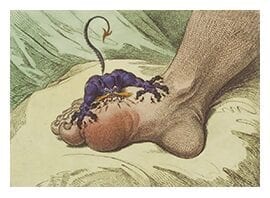Gout
Gout
 Gouty arthritis, or hyperuricemia is a common type of arthritis that occurs when uric acid builds up in blood and causes joint inflammation. In my practice, the most common descriptors patients present with are a painful, hot, swollen and red joint in the foot. The pain often times wakes the patient at night. The first metatarsal phalangeal joint (big toe joint) is the most frequent joint involved but it may be the ankle or any other joint in the foot that becomes attacked.
Gouty arthritis, or hyperuricemia is a common type of arthritis that occurs when uric acid builds up in blood and causes joint inflammation. In my practice, the most common descriptors patients present with are a painful, hot, swollen and red joint in the foot. The pain often times wakes the patient at night. The first metatarsal phalangeal joint (big toe joint) is the most frequent joint involved but it may be the ankle or any other joint in the foot that becomes attacked.
Basically, we ingest chemicals in our foods called purines. These purines are broken down into uric acid and the uric acid is mostly removed from our systems though the kidneys. Gout is caused by having higher-than-normal levels of uric acid in your body. This may occur if your body makes too much uric acid (over producer) or your body has a hard time getting rid of uric acid through the kidneys (under secretor).
Like too much sugar in your iced tea, if uric acid is too concentrated in your blood it will settle out. In the case of gout it typically settles out in the form of uric acid crystals in a cool joint which makes the foot the most likely location. These crystals cause the joint to swell up and become inflamed.
The exact cause is unknown. Gout may run in families. It is more common in men, in women after menopause, and those who drink alcohol. People who take certain medicines, such as hydrochlorothiazide and other water pills, may have higher levels of uric acid in the blood. This is often over looked.
After a first gouty attack, people will have no symptoms. Half of patients have another attack. In my practice every patient is allowed one gouty attack. Typically our doctors will give an injection, prescribe medications and they generally resolve in a few days. However, some people may develop chronic gout. Those with chronic arthritis develop joint damage and loss of motion in the joints. They will have joint pain and other symptoms most of the time. Therefore, more than one gouty attack requires extensive workup to determine the ongoing cause of elevated uric acid in the blood.
Some diet and lifestyle changes may help prevent gouty attacks:
- Avoid alcohol
- Reduce how many purine-rich foods you eat, especially anchovies, sardines, oils, herring, organ meat (liver, kidney, and sweetbreads), legumes (dried beans and peas), gravies, mushrooms, spinach, asparagus, cauliflower, consommé, and baking or brewer’s yeast.
- Limit how much meat you eat at each meal.
- Avoid fatty foods such as salad dressings, ice cream, and fried foods.
- Eat enough carbohydrates.
- If you are losing weight, lose it slowly. Quick weight loss may cause uric acid kidney stones to form.
PLEASE NOTE:
The information contained in this article is not intended to provide advice for individual problems, nor to substitute for professional advice or care from a physician. For answers to specific questions concerning your personal circumstances, you should consult your physician directly.
